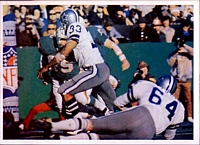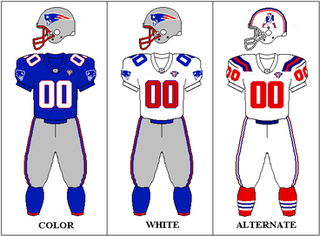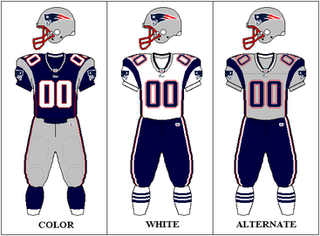Related Research Articles
The National Football League playoffs for the 1994 season began on December 31, 1994. The postseason tournament concluded with the San Francisco 49ers defeating the San Diego Chargers in Super Bowl XXIX, 49–26, on January 29, 1995, at Joe Robbie Stadium in Miami, Florida.

The National Football League playoffs for the 1985 season began on December 28, 1985. The postseason tournament concluded with the Chicago Bears defeating the New England Patriots in Super Bowl XX, 46–10, on January 26, 1986, at the Louisiana Superdome in New Orleans, Louisiana.

The National Football League playoffs for the 1982 season began on January 8, 1983. The postseason tournament concluded with the Washington Redskins defeating the Miami Dolphins in Super Bowl XVII, 27–17, on January 30, at the Rose Bowl in Pasadena, California.

The National Football League playoffs for the 1970 season began on December 26, 1970. The postseason tournament concluded with the Baltimore Colts defeating the Dallas Cowboys in Super Bowl V, 16–13, on January 17, 1971, at the Orange Bowl in Miami, Florida.

The National Football League playoffs for the 1971 season began on December 25, 1971. The postseason tournament concluded with the Dallas Cowboys defeating the Miami Dolphins in Super Bowl VI, 24–3, on January 16, 1972, at Tulane Stadium in New Orleans, Louisiana.
A trick play, also known as a gadget play, gimmick play or trickeration, is a play in gridiron football that uses deception and unorthodox tactics to fool the opposing team. A trick play is often risky, offering the potential for a large gain or a touchdown if it is successful, but with the chance of a significant loss of yards or a turnover if not. Trick plays are rarely used not only because of the riskiness, but also to maintain the element of surprise for when they are used.

The 2003 Indianapolis Colts season was the 51st season for the team in the National Football League and 20th in Indianapolis. The Colts improved on their 10–6 record from 2002, going 12-4 and reached the postseason for the second straight season. After the season, quarterback Peyton Manning was named league MVP along with Steve McNair of Tennessee.

The Dolphins–Jets rivalry is a rivalry between the Miami Dolphins and the New York Jets in the National Football League. The teams both play in the American Football Conference East Division, and play two scheduled games each season as a result. They have often competed for divisional supremacy, and have played a number of classic games. Currently, the Dolphins lead the series 57–55-1, while the Dolphins have won the lone postseason meeting, defeating the Jets in the 1982 AFC Championship.

The 1994 New England Patriots season was the team's 35th season, and 25th in the National Football League. It was the first under owner Robert Kraft, who purchased the team after preventing previous owner James Orthwein from moving the Patriots to St. Louis. The Patriots finished the season with a record of ten wins and six losses, and finished tied for first in the AFC's Eastern division.

The 2004 season was the New England Patriots' 35th in the National Football League (NFL), their 45th overall and their fifth under head coach Bill Belichick. They finished with their second consecutive 14–2 record before advancing to and winning Super Bowl XXXIX, their third Super Bowl victory in four years, and their last until 2014. They are, as of the present, the last team to repeat as NFL Champions and only the second to win 3 Super Bowls in a 4-year span.
The 1994 New York Jets season was the 35th season for the team and the 25th in the National Football League. It began with the team trying to improve upon its 8–8 record from 1993 under new head coach Pete Carroll. The franchise’s largest home crowd at that time, 75,606, watched the Jets battle Miami for a share of first place in the AFC East. The Jets led, 24–6, in the third quarter before Dan Marino led a furious comeback, capped by the “fake spike” touchdown pass to Mark Ingram, for the Dolphins’ 28–24 win. The Jets finished the season with a record of 6–10, losing six of their last seven games to end the season, and Carroll was fired. Following a Week 12 win at Minnesota, the Jets would lose 33 of the next 37 games.
The 1986 New York Jets season was the 27th season for the team and the seventeenth in the National Football League. It began with the team trying to improve upon its 11–5 record from 1985 and return to the playoffs under head coach Joe Walton. The Jets finished the season with a record of 10–6, qualifying for the top Wild Card spot in the playoffs despite losing their last five games of the season. They defeated the Kansas City Chiefs in the Wild Card round, but lost to the Cleveland Browns in the divisional round. The loss to the Browns is infamous in Jets history. Leading 20–10 in the 4th quarter, the Jets collapsed when Mark Gastineau hammered Browns quarterback Bernie Kosar seconds after he released a pass; Gastineau was flagged for roughing the passer and the Browns rallied to force overtime and win early in the game's second overtime.
NFL Classics is a series of videotaped rebroadcasts of National Football League games that air on the NFL Network. The show airs weekly during the offseason and also occasionally during the NFL season. As of the 2010, the series airs on Monday night while Super Bowl Classics airs on Friday night.

Daniel Constantine Marino Jr. is an American former football quarterback who played in the National Football League (NFL) for 17 seasons with the Miami Dolphins. After a successful college career at Pittsburgh and being named First-team All-American in 1981, Marino was the last quarterback taken in the first round of the quarterback class of 1983. Marino held or currently holds dozens of NFL records associated with the quarterback position, and despite never being on a Super Bowl-winning team, he is recognized among the greatest quarterbacks in American football history.
The 1994 Miami Dolphins season was the franchise's 29th season of existence and 25th in the National Football League. On March 23, the NFL approved the transfer of majority interest in the team from the Robbie family to Wayne Huizenga.
The 2000 Miami Dolphins season was the franchise's 31st season in the National Football League, the 35th overall and was their first under new head coach Dave Wannstedt who was named the fourth head coach in franchise history on January 16, 2000, the same day that Jimmy Johnson announced his retirement from coaching. This was also the first season since 1982 that long-time quarterback Dan Marino was not on the roster, as he announced his retirement prior to the season. Believed by many as the greatest Miami Dolphin of all time, Marino led the Dolphins to 10 playoff appearances, as well as Super Bowl XIX, and is the winningest quarterback to have not won a Super Bowl. Jay Fiedler, who left the Jacksonville Jaguars, succeeded Marino as starting quarterback. Damon Huard remained a backup quarterback and started for Fiedler in one game during the season.
The 1999 Miami Dolphins season was the team's 34th campaign, and 30th in the National Football League. It was the 17th and final season for Dolphins quarterback Dan Marino. Marino suffered an injury on October 17 against the New England Patriots, with Damon Huard taking over at quarterback. The team would go 4–1 under Huard, including a 17–0 victory over the Tennessee Titans. Marino would return on November 25, against the Dallas Cowboys, throwing five interceptions in the 20–0 loss.

The Clock Play was a famous trick play in American football, immortalized in what came to be known as the Fake Spike Game, played on November 27, 1994. The contest was played by the National Football League (NFL)'s Miami Dolphins and New York Jets that featured one of the most famous comeback plays in league history. Dolphins quarterback Dan Marino ran a trick play, pretending to stop the game clock but instead threw a pass that scored the game-winning touchdown, ultimately giving Miami the 28–24 victory.

The 2012 Miami Dolphins season was the franchise's 43rd season in the National Football League (NFL), and the 47th overall in the American Football Conference Eastern Division. The season concluded with the Dolphins finishing second in the AFC Eastern Division with a 7–9 record, and no postseason play for the fourth consecutive season.

The Colts Catastrophe was an unsuccessful National Football League (NFL) trick play attempted by the Indianapolis Colts against the New England Patriots on October 18, 2015. It occurred near the end of the third quarter in the teams' Week 6 game of the 2015 NFL season.
References
- ↑ Kirwan, Pat. "Once a rival, Marino now a friend". NFL. Archived from the original on April 28, 2007. Retrieved August 9, 2016.
- ↑ Stellino, Vito (November 25, 2001). "Jaguars: NFL Confidential: Manning fake fooled even the ref". The Florida Times-Union . Retrieved August 9, 2016.
- ↑ "The Browns got away with illegal fake spike before game-winning field goal vs. Panthers".